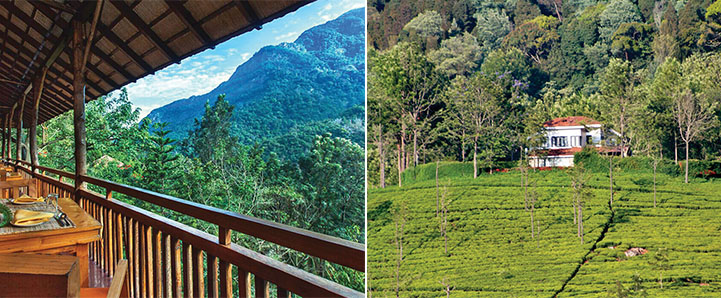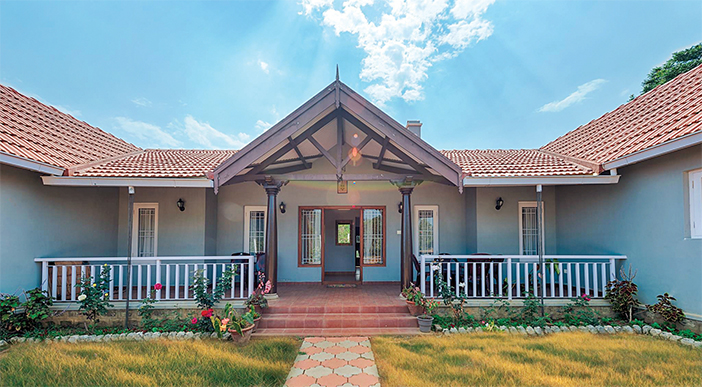Homestays in Coonoor
India & You
November December 2017
A homestay can be quite a rewarding experience – a fun, immersive way to travel and experience places such as Coonoor on the Nilgiri Mountain range in southern India.
Authenticity of a travel experience that can bring the taste of life as a local is indeed very special along with being educational. Undoubtedly, it is an increasingly chased aspect of travel as authenticity, in general, runs on short supply. In this aspect, accommodation can go a long way in fulfilling that need, or not. There are several modes of accommodation – the conventional hotels, community hostel sharing experience, camping as well as living in a homestay, the last being something that has become popular among travellers of late. The idea of a homestay is simple; a house, a host and a traveller, looking for the atmosphere of a home, away from home. These three elements can help a traveller’s search for a genuine experience – to live, see, eat and sleep like a local.
Homestays in India are largely found in rural, cut off as well as popular destinations on different terrains than the larger cities, mainly due to absence of formal hotels in these areas. Yet there are several cities such as Kolkata in eastern India and Jaipur in western India offering the mix of traditional ways of living within the labyrinth of the city. What are more cherished, and wanted in larger numbers, are the homestays in remote corners of the country, the places that remain pristine, as well as areas such as hills and tea plantations, where living in a home can be more exciting than a boxed up hotel. Even as there are high rated properties coming up within plantations and other such remote locations, even if one does allot a high budget to their accommodation, the experience perhaps can miss the mark of being an immersive, local one.
Amidst nature
I took my first homestay at a small organic tea garden close to the hill town of Coonoor in the state of Tamil Nadu in southern India. A hill town, increasingly commercial, the destination has much physical beauty to offer owing to the fact that it is on the Nilgiris range, with mist and clouds surrounding winding roads filled with delicious tea that grows here. A little less than 10 kilometres away from the main town, plantations with charming bungalows housed inside them seem to escape the touristy buzz, are increasingly offering homestays. Apart from this part of the country, several tea plantations in other parts of the country such as Assam in north-eastern India have also begun offering homestays as part of a unique and immersive staying experience.
The part of India where I took this homestay is known for tea production, namely its Niligiri tea, and plantations here are opening up homestays for several reasons. Waking up to a view from my bed overlooking a row of tea plants while sipping on fresh tea grown on the same ground was a memorable moment from the experience. I imagined myself then to be the keeper of the estate who has an incredible view from the balcony, overlooking the greenest of green leaves. Perhaps that is among the many things preferable in the homestay over a camping or hotel stay in such a place – the proximity to nature with the warmth of a home.

From left to right: Homestays in plantations are inspired by colonial bungalows; A typical view from a homestay in Coonoor; Tea plantations add to the beauty of the landscape
Learning and living
My first day at the homestay involved a tour of the plantation around me, which was followed by a delicious meal and engaging conversation. I learned a little about the process of tea making and how the leaves and plants are grown organically, whilst the process was actually unfolding in front of me. In the course of the day, I also met some local girls who passed the road besides the gates of the plantation on their way back from school. Language was a minor barrier, as it is in many parts of India, but the caretaker of the plantation played translator. The girls were as curious about life in my part of the country as I was in theirs and the conversation was short but informative .
We proceeded to have a heavy lunch that was made by the caretaker in the local style. Throughout southern India, dosas or rice flour crepes and idlis or rice cakes along with coconut chutney and a curry of vegetables and pulses, known as sambhar, remain common and popular snacks but each region has its own specialties and variants in the regular food. Sitting down for tea and snacks in the evening, the owner of the estate and my host, joins in to tell me about the history of the plantations of the city, as well as how it has seen several changes through time.
History, as lived through someone’s own experience certainly makes it more interesting. A number of tea plantations in this part of the country have roots in the colonial times when the British came and set them up alongside hill towns, which also served as summer capitals, and it is the aesthetic of the bungalows from these times that many new hotels and homestays try to recreate, the owner of the estate informs me.
Insider information
Treks in and around Coonoor remain popular among some of the tourists that throng here and some of the sightseeing points in particular can turn out to swelling with crowds and often robbed of the silence that nature can offer. Connoor, made popular in some Bollywood movies such as the recent Kapoor and Sons, also serves as a destination in itself as a quaint hill town that otherwise gets overlooked because of the neighbouring town of Ooty, which is more well-known and preferred among tourists.
Despite staying in the cut off plantation which was a world of its own, urged by the caretaker, I took a short trip up the popular Dolphin’s Nose viewpoint. Busy and crowded as it was, it was also a nice place to view the green and blue hills of the Nilgiris around. The owner of the estate had also earlier recommended a local shop to buy some of the eucalyptus oil that is sold and made here in abundance. Another local product that came highly recommended was the home-made chocolate.
As the evening drew nearer, I headed back to my homestay to have a refreshing cup of tea while walking around now in the plantation itself. I spoke to my host, curious about what made him turn his home into an abode for strangers, besides the economics of it. He said, echoing many a traveller’s words, that sharing stories and experiences was perhaps the best way to learn and immerse oneself in the different things a place has to offer.










